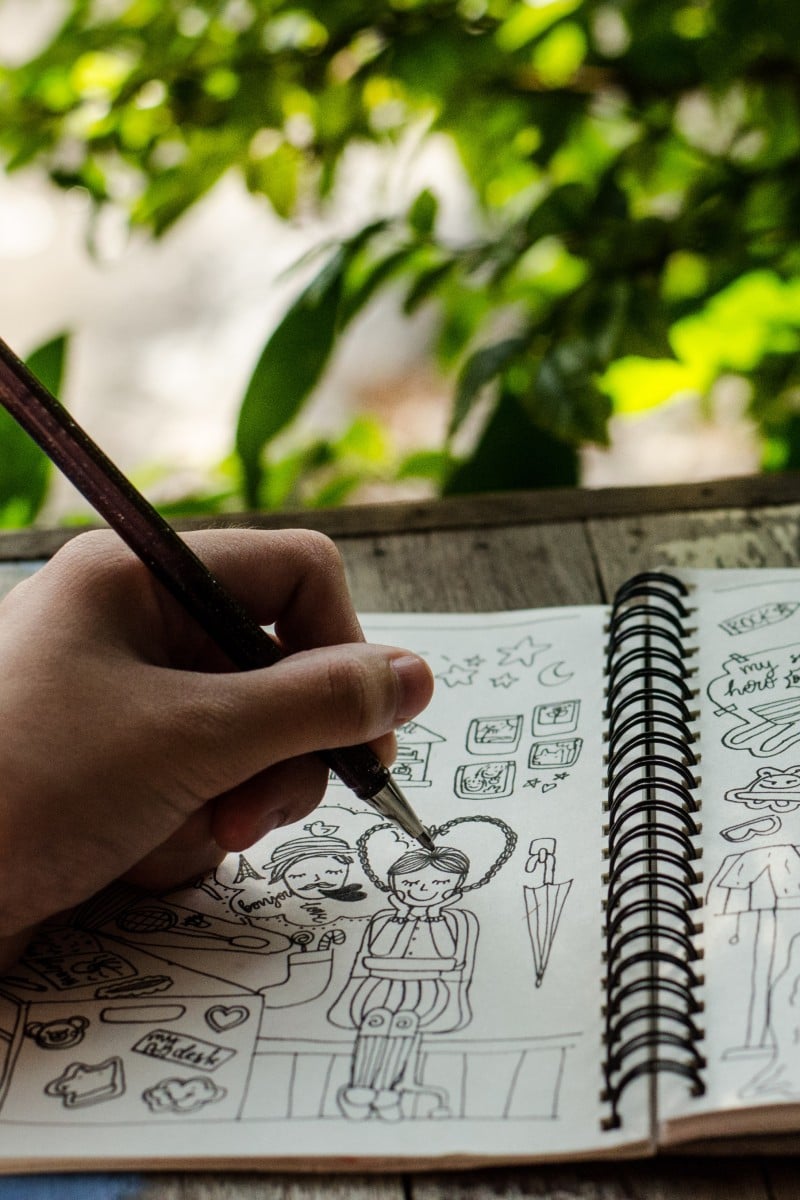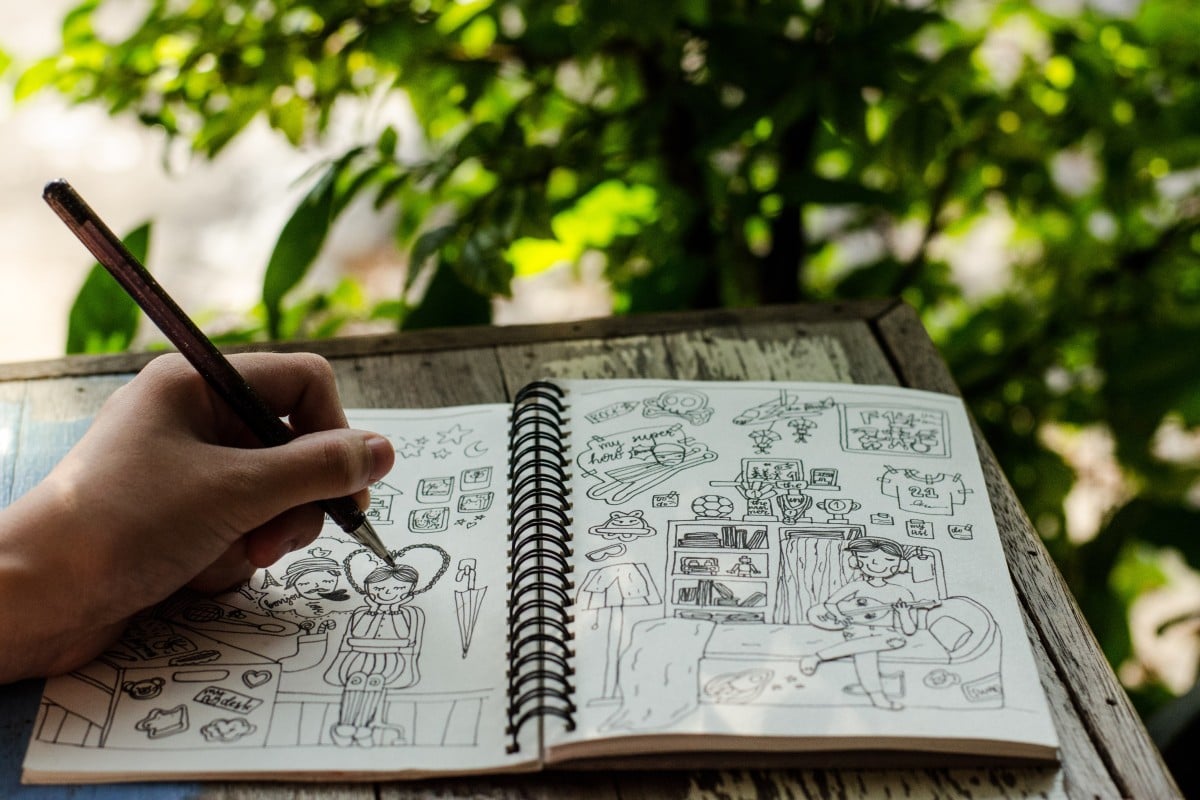
5-minute listening: Doodle your inner artist
- Practise your English with our short listening exercises: play the audio linked below; answer the questions; and check the answers at the bottom of the page
- In this week’s podcast, we find out some of the benefits of doodling, and what your drawings could be saying about your personality or mood
 Doodling can actually help you to relieve stress. Photo: Shutterstock
Doodling can actually help you to relieve stress. Photo: ShutterstockClick on the video below for the audio.
Play a Kahoot! game about this podcast as a class or with your friends by clicking on the link here.
Or play on your own below to test your understanding:
Questions
1. According to the podcast, when do we usually doodle?
A. when we are feeling bored
B. when we are giving a presentation
C. when we are focused on doing something
D. when we are busy
2. Which of these are considered doodles?
A. scribbles
B. patterns
C. shapes
D. all of the above
3. “An idle moment” is when someone is …
A. drawing
B. not doing much
C. feeling excited
D. extremely busy
4. Which word in the podcast has a similar meaning to “doodles”?
A. interest
B. attention
C. squiggles
D. language
5. By studying our doodles, what can we learn about ourselves?
A. different aspects of our character
B. the meaning of our dreams
C. what we are good at doing
D. how well we might do in examinations
6. People with what type of personality would doodle these shapes?
A. someone who is very intelligent
B. someone who is not easily agitated
C. someone who is very lively
D. someone who is stingy
7. What might someone who is naturally calm be doodling?
8. What sort of person might someone be if their doodling involves short, quick lines?
A. someone who makes friends easily
B. someone who is nervous about speaking to others
C. someone who is loud and noisy
D. someone who gets in a bad mood easily
9. According to the podcast, which of the following can affect our styles of doodling?
A. how we feel
B. our age
C. whom we are with
D. none of the above
10. Which of these doodles is most common?
11. If you are in love with someone, you are likely to …
A. draw flowers
B. scribble the person’s name
C. doodle suns
D. all of the above
12. What could it mean if people doodle at the top of the page?
A. They are missing another person.
B. They are worried about their future.
C. They are deep in thought about something.
D. They are thinking of the past.
13. Which part of a page might people doodle if they are able to do something for a long time without becoming angry?
A. bottom of a page
B. right margin
C. middle of a page
D. everywhere
14. If you are “killing time”, you are …
A. asking someone to do something urgent for you
B. doing something that is not important while waiting for something else to happen
C. finding an easier way to do something that is extremely complicated
D. trying to get away from doing something you dislike
15. Why is doodling good for us according to the end of the podcast?
A. It allows us to feel more relaxed.
B. It helps us concentrate.
C. It improves our memory.
D. all of the above
Answers
1. A
2. D
3. B
4. C
5. A
6. C
7. D
8. B
9. A
10. A
11. B
12. C
13. D
14. B
15. D
Script
Voice 1: Can’t focus in class? Find yourself barely listening to a classmate giving a presentation? Chances are you’ll start doodling. To doodle means to draw things with your pen or pencil when you are feeling bored. Doodles can be in the form of random patterns, shapes or scribbles – pretty much anything we draw in an idle moment while the focus of our attention is elsewhere.
Voice 2: But did you know? Whether it’s hearts, flowers, funny faces or zigzags, our doodles say a lot about our personalities.
Voice 1: According to doodle analysts, our squiggles can be a form of body language. People who are more emotional tend to draw round shapes like circles, moons, lips and balloons. Those with calmer personalities might doodle squares, boxes, windows, doors and houses.
Voice 2: Confident individuals with a lot of energy usually scribble shapes like arrows, zigzags, church spires and stick figures. And if your doodles are bold and heavy, you are likely a very self-assured person. On the other hand, those who are a bit shy and sensitive often doodle with quick, short lines.
Voice 1: Certain shapes are more popular than others. Many of us draw suns, boxes, stars, flowers and hearts. Our style of doodling can also differ depending on our mood. Someone who is feeling down is prone to drawing sad faces or twisted shapes. And if a person is in love, names of their romantic interest, faces and hearts will be frequently seen in their doodling.
Voice 2: The position of your squiggles can be telling too. If you doodle at the top of a page, this might mean that you are in a thoughtful mood. If your doodles are at the bottom of the paper, you are likely concerned with practical things. Doodling in the right margin might mean you are thinking about the future, and the left margin indicates you are thinking about the past. Drawing the same shape or object repeatedly on different spots is likely a sign of patience and perseverance.
Voice 1: Doodling is not just a fun activity for killing time. We can benefit from it in other ways too. An article published on the Harvard Medical School’s health blog says that doodling is great for releasing stress and improving focus. It has also been linked to improved memory, as well as helping to fire up our creativity. So, don’t feel embarrassed the next time someone points out your scribbles. Instead, pass them a pencil too!